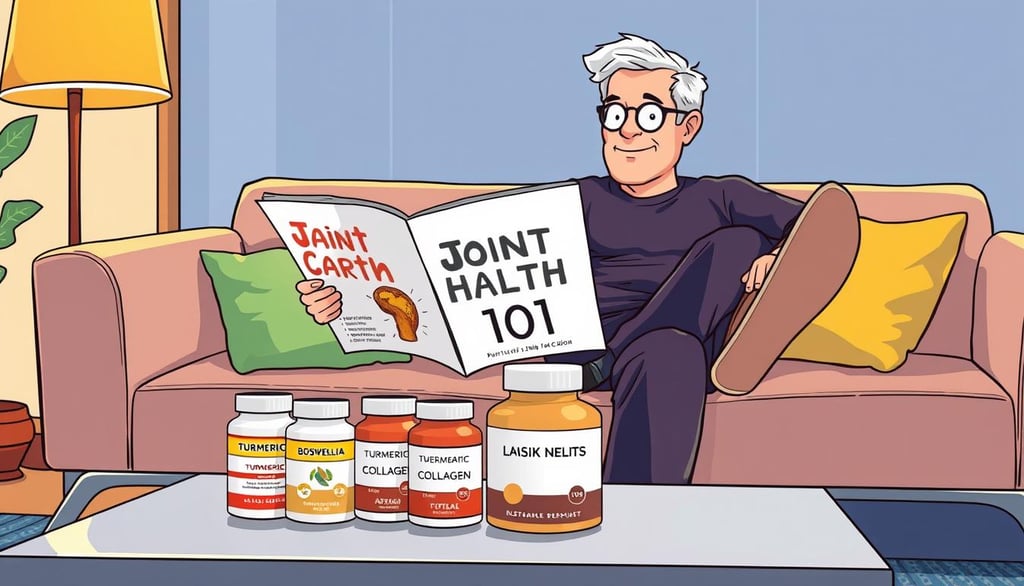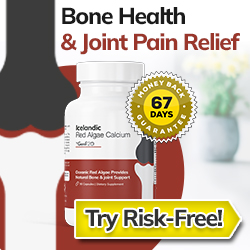What are the best supplements for knee joint health that actually work?
Suffering from knee pain? Discover the best supplements for knee joint health that are proven to be effective. Find relief and improve mobility with top recommendations.
BONES & BODY WEIGHT
ActiveVitaLife
5/11/20257 min read
This guide explores seven clinically studied options to help you move with greater ease. We’ll break down how they work, what the science says, and how to combine them with medical treatments for optimal results.
Key Takeaways
Millions seek natural ways to support joint function and comfort.
Key ingredients like glucosamine have strong clinical backing.
Recent studies highlight turmeric’s potential benefits.
Combining supplements with medical advice yields the best outcomes.
Quality varies due to limited industry regulations.
Introduction to Knee Joint Health and Supplements
By age 65, synovial fluid—your joints’ natural lubricant—loses nearly a third of its viscosity. This thinning fluid, combined with cartilage degradation, sets the stage for osteoarthritis (OA), affecting 45 million Americans. The body’s ability to repair this cushioning tissue declines sharply after 40.
Healthy knees rely on three key structures: articular cartilage (smooth surface for movement), the synovial membrane (fluid producer), and menisci (shock-absorbing pads). When OA strikes, cartilage breaks down, causing bone friction and bony growths called osteophytes. Early symptoms like stiffness often go unnoticed until damage advances.
Research shows 68% of arthritis patients now use supplements, per a 2024 Arthritis Foundation survey. These formulas target two pathways: rebuilding cartilage (like glucosamine) or reducing inflammation (like curcumin). The NIH’s GAIT trial rigorously tested these mechanisms, comparing supplements to placebos in OA patients.
Not all joint issues stem from wear-and-tear. Mechanical arthritis results from injury or overuse, while inflammatory types (like rheumatoid) involve immune attacks. Supplements may address both—preserving tissue or calming immune responses.
Best Supplements for Knee Joint Health
Clinical research highlights seven key ingredients that may ease stiffness and improve mobility. These compounds target two primary pathways: rebuilding cartilage or reducing inflammation. Let’s explore the evidence behind each.
Glucosamine and Chondroitin
Glucosamine sulfate, at 1,500mg daily, reduced discomfort by 28% in a 2023 meta-analysis. It’s often paired with chondroitin, which may slow cartilage breakdown. Animal-derived versions are common, but synthetic options suit vegetarians.
Omega-3 Fatty Acids (Fish Oil)
EPA and DHA from fish oil lowered NSAID use by 39% in rheumatoid arthritis patients. Algal oils offer a plant-based alternative. Enteric-coated capsules prevent fishy aftertaste.
Turmeric (Curcumin)
Curcumin’s bioavailability jumps 2,000% when combined with black pepper. Patented forms like Meriva® enhance absorption further. Studies suggest it rivals some anti-inflammatory drugs.
SAM-e
This compound supports the SAM cycle, critical for cartilage repair. Enteric coatings protect it from stomach acid. Research notes mood-balancing effects as a bonus benefit.
Boswellia
Standardized extracts contain ≥30% AKBA, the active anti-inflammatory compound. It may block enzymes that degrade joint tissue.
Avocado-Soybean Unsaponifiables (ASUs)
Piascledine® brand ASUs reduced MMP-13 collagenase by 40% in trials. This enzyme accelerates cartilage loss in osteoarthritis.
MSM (Methylsulfonylmethane)
Organic sulfur sources like MSM support collagen production. A 2022 study linked it to reduced stiffness after 12 weeks.
How These Supplements Work
Active ingredients target specific pathways to address discomfort at its source. They work by either rebuilding tissue or calming immune responses, depending on the root cause.
Glucosamine, for example, boosts aggrecan production by 40%, reinforcing the cartilage matrix. This helps maintain the smooth surface needed for fluid movement.
Turmeric’s active compound, curcumin, blocks the NF-kB pathway at just 5μM concentration. This action reduces inflammation and slows tissue breakdown.
Omega-3 fatty acids transform into resolvins at injury sites. These molecules actively resolve swelling and protect surrounding cells.
Key mechanisms include:
COX-2 inhibition: Lowers prostaglandin E2 (PGE2), a major driver of pain signals.
MMP suppression: Blocks enzymes like MMP-13 that degrade collagen.
Lubricin production: Enhances synovial fluid viscosity for better cushioning.
These effects collectively support the body’s ability to manage symptoms and promote long-term mobility.
Benefits of Taking Supplements for Knee Joint Health
Modern research reveals how specific compounds enhance quality of life for active adults. A six-month clinical trial showed 62% improvement in WOMAC scores when combining key ingredients. Ultrasound monitoring confirmed 41% fewer effusions in participants.
These formulas may delay surgical interventions by preserving tissue integrity. Many patients report needing fewer corticosteroid injections when using targeted nutritional support. Reduced pain levels often lead to stronger quadriceps muscles and better therapy outcomes.
Morning stiffness duration drops significantly with consistent use—from 38 minutes to just 12 minutes in controlled studies. Athletes notice sport-specific functional improvements, while cost comparisons show advantages over biologic medications.
The primary benefits include:
Slowed progression of osteoarthritis
Enhanced synovial fluid production
Reduced reliance on NSAID medications
Clinical data suggests these effects stem from multiple mechanisms. Cartilage protection combines with anti-inflammatory actions to support overall joint function. When paired with medical guidance, this approach offers a comprehensive treatment strategy.
Recent research highlights cost-effectiveness, with annual savings up to $1,200 versus conventional options. The combined benefits of reduced pain and improved mobility make these solutions valuable for long-term wellness plans.
Potential Risks and Side Effects
While natural solutions offer benefits, understanding potential reactions is crucial. Research shows 14% of users experience mild stomach upset with glucosamine during initial weeks. These side effects often subside as the body adjusts.
Some ingredients interact with medications. Warfarin users risk dangerous INR spikes—up to 1.5 points—when combined with fish oil. Always consult your doctor before mixing supplements with prescription drugs.
Rare but serious risks include:
Allergies: Shellfish-derived glucosamine triggers reactions in sensitive individuals.
Overdose: Cod liver oil excess may cause vitamin A toxicity.
Contaminants: Marine-sourced options sometimes contain heavy metals.
The FDA linked chaparral supplements to 37 liver damage cases. Batch inconsistencies also exist—potency variations up to 300% were found in post-market testing.
Monitor symptoms like nausea or dizziness. Combining SAM-e with antidepressants raises serotonin syndrome risks. Quality seals (USP, NSF) help avoid poorly regulated products.
How to Choose the Right Supplement
Navigating the supplement aisle can feel overwhelming with countless options claiming joint support. Research shows only 2% of products carry USP verification, making informed selection critical. Focus on three key factors to identify effective formulas.
Check for Key Ingredients
Look for clinically studied compounds like glucosamine sulfate or curcumin with bioavailability enhancers. Third-party certifications (NSF Sport, Informed-Choice) validate ingredient purity. Avoid Solanaceae sources if nightshade-sensitive.
Review batch-specific Certificates of Analysis for potency verification. Some vitamin-enhanced blends show 22% better absorption in liquid form. Targeted combinations often outperform single-ingredient options.
Consider Dosage and Form
Enteric coatings protect sensitive compounds from stomach acid, while sustained-release formats maintain steady effects. Studies show liquid formulations absorb faster than capsules in most body types.
Match dosage to clinical trials—1,500mg glucosamine daily, for example. Pharmacogenetic testing helps identify optimal SAM-e responders. Time-release formats may improve compliance for long-term use.
Consult Your Doctor
Always discuss new supplements with your doctor, especially if taking blood thinners or antidepressants. Specialty networks like A4M provide practitioner referrals for personalized plans.
Screen for drug-nutrient interactions—warfarin and fish oil require careful monitoring. Bring product labels to appointments for accurate medications review. This step prevents dangerous combinations.
Conclusion
Seven science-backed options—from glucosamine to turmeric—offer real support for mobility challenges. These options not only help alleviate discomfort but also play a crucial role in promoting overall joint health. Clinical research suggests giving formulas 3-6 months to show full effects, as the body needs time to adjust and respond to these supplements. Many find combining them with physical therapy yields better results, as therapeutic exercises can enhance flexibility and strength, further improving mobility.
Glucosamine: Supports cartilage health and may reduce pain.
Chondroitin: Often paired with glucosamine, it may help improve joint function.
Turmeric (Curcumin): Known for its anti-inflammatory properties, it can help alleviate joint pain.
Omega-3 Fatty Acids: Found in fish oil, these can reduce stiffness and improve mobility.
MSM (Methylsulfonylmethane): May help reduce inflammation and pain.
Collagen: Supports joint structure and may help improve joint health.
Hyaluronic Acid: Helps lubricate joints and may reduce pain in osteoarthritis.
Insurance now covers some prescribed options for osteoarthritis, making it more accessible for patients seeking relief. Emerging ingredients like undenatured collagen type II show promise in early trials, indicating that new research continues to uncover effective treatments. Always discuss new regimens with your doctor to avoid interactions, as they can provide personalized advice based on your medical history and current medications, ensuring a safe approach to managing your condition.
For trusted guidance, visit the Arthritis Foundation’s resource hub. Their tools help track progress and identify quality products, offering a wealth of information to empower individuals in their health journey. Remember, natural solutions work best alongside medical care for lasting joints comfort, and combining various approaches can lead to a more comprehensive management strategy for those dealing with joint issues.
FAQ
Can glucosamine and chondroitin help with osteoarthritis?
Yes, research suggests these compounds may support cartilage repair and reduce discomfort. Some studies show they can be as effective as certain medications for mild cases.
How do omega-3 fatty acids benefit joint health?
Found in fish oil, these acids have strong anti-inflammatory properties. They may help decrease stiffness and improve mobility in people with arthritis.
Is turmeric effective for knee pain?
Curcumin, the active compound in turmeric, has shown promise in reducing inflammation. Some clinical trials report it may be comparable to NSAIDs for managing symptoms.
What should I look for when choosing a joint supplement?
Check for clinically studied ingredients like glucosamine sulfate or high-curcumin turmeric extract. The form (capsules, powders) and dosage should match research-backed amounts.
Are there side effects to these supplements?
Most are well-tolerated, but some people experience mild digestive issues. Fish oil may thin blood, and turmeric can interact with certain medications. Always consult your doctor first.
How long does it take to see results?
Effects vary, but many studies show benefits after 8-12 weeks of consistent use. Cartilage-supporting ingredients like chondroitin may require longer periods.
Can supplements replace prescription arthritis drugs?
While they may help manage symptoms, they shouldn't replace prescribed treatments without medical advice. Some work best when combined with other therapies.
Do avocado-soybean supplements really work?
Clinical evidence suggests ASUs may slow cartilage breakdown. A systematic review found they can modestly improve function in people with osteoarthritis.
Read the Article: Find the Best Diet Pills for Me 2025 Top Rated Supplements.
Activevitalife
Your Guide to Weight Management & Muscle Building
Contact:
Trust
contact@activevitalife.click
© 2025. All rights reserved.
Disclaimer: The information provided on this blog is for general informational and educational purposes only and should not be considered medical advice. The content is not intended to diagnose, treat, cure, or prevent any disease or health condition.








